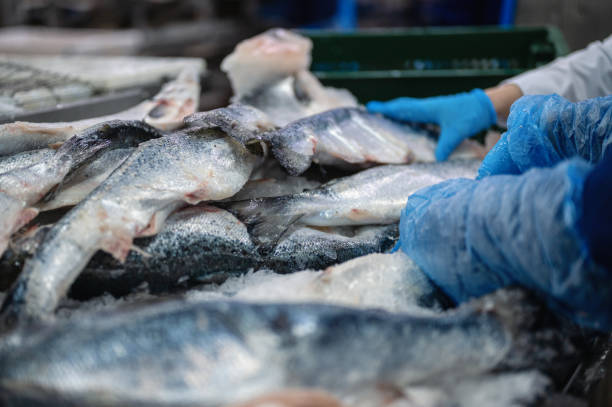All You Need to Know about How to Buy and Export Non-Fillet Frozen Fish from Kenya
All You Need to Know about How to Buy and Export Non-Fillet Frozen Fish from Kenya
In today’s world of global trade, businesses need to move fast and think smart to remain profitable and stand out from the competition. Investing in a new export business is exciting but also challenging, particularly if you are new to exporting. If you are thinking of buying and exporting non-fillet frozen fish from Kenya, this blog post will serve as your guide. Here we discuss everything you need to know about how to buy and export non-fillet frozen fish from Kenya including why it is important to invest in this business venture, who the primary buyers of non-fillet frozen fish from Kenya are, what operational costs are associated with buying and exporting non-fillet frozen fish from Kenya , supplier market research, establishing your operations with third party services such as freight forwarding or logistics provider, prerequisites for operating as an exporter or import agent, documentation required for import or export registration, calculating the cost of goods sold for tax purposes when selling non-fillet frozen fish from Kenya , potential financing options such
What is Non-Fillet Frozen Fish?
Non-fillet frozen fish are whole fish that have been gutted and filleted, frozen, and then placed back into the freezer. They are a good option if you like to keep your freezer stocked with fish, but don’t have a lot of storage space. Non-fillet frozen fish are graded in the same way that fresh fish are graded. They are sold in units of pounds, with the largest fish weighing approximately 1 pound. The amount of fish in each pound will vary. The boxes used to package non-fillet frozen fish are usually made from cardboard, but can be made from other materials. You can choose to use your own boxes, or you can use the ones provided by your supplier.
Why should you import and export non-fillet frozen fish from Kenya?
The United States is the world’s largest importer of fish and seafood, accounting for 21% of global imports. If you can enter the U.S. market, you will be in good company. There are more than 100,000 seafood importers in the United States, which is why it is important to stand out from the competition. Buying and exporting non-fillet frozen fish from Kenya is a great way to do just that. If you are importing and exporting non-fillet frozen fish from Kenya, you will have a competitive advantage because it is an affordable product that can be used in many different types of dishes and meals. Depending on the type of fish you buy, frozen fish can be an excellent food source for those who do not eat fish as a dietary staple.
Who are the primary buyers of non-fillet frozen fish from Kenya?
Like many other seafood products, non-fillet frozen fish from Kenya is distributed to both the domestic and international markets. Some of the primary importers of non-fillet frozen fish from Kenya include the United States, the United Kingdom, South Korea, Japan, and Taiwan. The United States imports frozen fish from Kenya to fulfill the demand for low-cost, low-quality frozen fish meal. This meal is primarily used as food for livestock such as pigs, cows, and chickens. Other importers of frozen fish from Kenya include the United Kingdom, where frozen fish is used for sandwiches, processed foods, and prepared meals.
What are the operational costs associated with buying and exporting non-fillet frozen fish from Kenya?
Costs associated with buying and exporting non-fillet frozen fish from Kenya are relatively low compared to the other types of seafood products. This is because the product is frozen, which helps to control the costs associated with spoilage. If you decide to purchase non-fillet frozen fish from Kenya directly from the supplier, you will incur transportation costs associated with importing the product from Kenya. If you purchase non-fillet frozen fish from Kenya from other importers, you will not incur transportation costs.
Suppliers Market Research and Operational Requirements for Importing Non-Fillet Frozen Fish From Kenya
Before you decide to buy non-fillet frozen fish from Kenya, you should conduct suppliers market research to ensure that you are purchasing from a reputable supplier. The best place to start is with the Frozen Seafood Products from Kenya report. You also need to determine how your product will be shipped to get an idea of the operational requirements for importing frozen fish from Kenya. Frozen seafood can be shipped by air freight, ocean freight, or by truck. There are also transportation options that are a combination of these, such as truck and rail. The best way to determine the most efficient shipping method is to calculate the cost of shipping frozen fish from Kenya to your desired destination.
Prerequisites for Importing Frozen Fish From Kenya
Before you can import non-fillet frozen fish from Kenya, you will have to become registered as an importer or exporter with the Kenya Customs Authority (KCA). You can visit the KCA website to apply for registration. You will have to provide information such as your business name, your address, your phone number, and your email address. You will also have to provide the type of goods that you intend to import or export, and the country from which you will be importing or exporting. If you are importing non-fillet frozen fish from Kenya, you will also have to apply for a health certificate and a phytosanitary certificate. These documents will help to ensure that the frozen fish you import is not contaminated. Your supplier will need to provide these documents before the shipment can be cleared by the Kenya Port Health Authority.
Step by step guide to register as an importer or exporter of non-fillet frozen fish from Kenya.
Once you have completed your supplier market research and determined that non-fillet frozen fish from Kenya is the product for you, you can proceed with the registration process as an importer or exporter of frozen fish from Kenya. Below is a step by step guide to help you through the process.
Conclusion
The global frozen fish market is projected to grow at a CAGR of 5% over the next 10 years. This is good news for importers of frozen fish from Kenya, as frozen fish is a highly sought-after product in many markets, including the United States and the United Kingdom. As a buyer of non-fillet frozen fish from Kenya, you have a lot of options available to you. You can choose to import frozen fish from Kenya directly from the supplier, or you can purchase it from another importer. Whichever option you decide to go with, it is important that you conduct suppliers market research to ensure that you are dealing with a reputable source. In order to import frozen fish from Kenya, you will first have to become registered as an importer or exporter with the Kenya Customs Authority (KCA).








LEAVE A COMMENT
You must be logged in to post a comment.